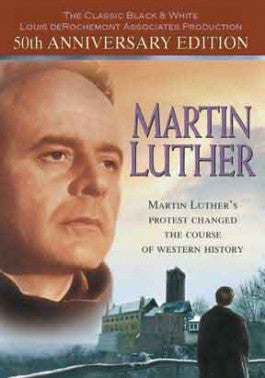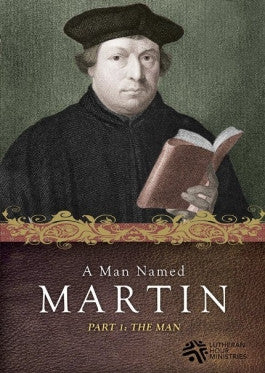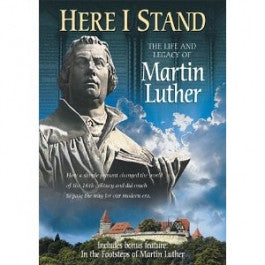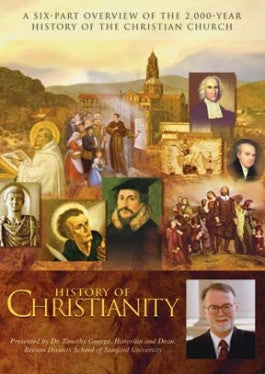
Martin Luther DVD
Watch TrailerAdditional Information
- Languages: English, Spanish, Portuguese, German and Korean
- Run Time: 105 minutes
- Screen Format: FS
- Subtitles: English, Spanish, Portuguese, German and Korean
- Region Code: 1 See More
Sale price
$5.00
Regular price
$14.99
You save 67%
Estimated arrival between and for USA.

You might also like
Martin Luther DVD - A Spectacular Film about the Great Reformer
Martin Luther, released in 1953, is a spectacular biography following the life of Martin Luther. Full of careful research and attention to detail, this movie gives viewers an in-depth look into the life of one of history's most important figures. Follow along with Luther's life as he makes a transition from a monk burdened with guilt to a powerful figure breaking with the oppressive Roman Church. Viewers will be enticed by the dramatic style of this film. Though packed with information, it is extremely entertaining. Luther's tale is told in a gripping dramatic way, and will keep you on the edge of your seat.
A Spectacular Film
Though released over 60 years ago, Martin Luther is still looked to today as an amazing movie and useful teaching tool. It was named the fourth best film of 1953 by the National Board of Review, providing it with a great reputation. It was nominated for two Academy Awards for Best Cinematography and Art Direction/Set Decoration.
This film is timeless because countless hours of research went into it. The story of Martin Luther was researched thoroughly by Reformation scholars Theodore G. Tappert and Jaroslav Pelikan. They assisted the writers of the film by providing them with accurate historical facts regarding Luther's life.
Despite this, a few historical inconsistencies were present in the film. For instance, Pope Julius II is shown as being in Rome when Luther was there, when he was actually not present in Rome at that time. One characters, when discussing indulgences, said that no confession needed to be made when an indulgence is purchased. However, if an indulgence was bought for personal use, that person was to go to confession. Luther's treatises of 1520 are shown being in print by June 15th of that year, when in reality, they were not. Luther is shown telling a character to leave Wittenburg, when in actuality, Luther begged this man to return after he voluntarily left.
Martin Luther is a powerful film and a compelling story. The film begins with a narrative by John Wiggins, giving an overview of the time and place that Luther's story starts. At this point in time, religious power was divided between the Emperor of the Holy Roman Empire and the Roman Catholic Church. In order to give viewers an understanding of the church's stance on religion, Wiggins states that "the Church had largely forgotten the mercies of God, and instead, emphasized the God's implacable judgments". This sets the tone of religious tyranny in Luther's world at that time.
Luther's entrance into the monastery is shown in the beginning of this film, and the personal struggle that came with it. He struggles to find the spiritual peace that he had hoped for within the monastic life, even though he has strictly followed the rules of the monastery. These rules include self-flagellation, where Luther is shown flagellating himself almost to the point of death. As a newly ordained priest, the film depicts the terror gripping his heart as he celebrates his first Mass. Luther confesses to his mentor that he cannot love God in this life. The authority in the monastery threatens to expel Luther, but his mentor believes that deep theological study and a trip to Rome will help put Luther's mind at ease. He is allowed this and is not expelled from the monastery.
After his pilgrimage to Rome, Luther returns and proposes his ideas to other monks. He firmly believes that the common people could find God if they were allowed to have a Bible in their common language. He is scolded and rebuked for these outlandish ideas, but he does not give up hope.
Luther goes on to receive his Doctor of Theology degree, and promises to dedicate his life to the teachings of the church. However, he still feels uncomfortable with the practices of the church, and feels great spiritual unrest.
Years pass, and the year 1517 arrives. Pope Leo X and Johann Tetzel popularize indulgences. These indulgences may be purchased from the church to reduce one's time in purgatory. They can be purchased for family members that are dead or can be used to reduce one's own punishment. The church became extremely caught up in the selling of these indulgences, mainly for the financial rewards they received. Luther began to see that the church was not interested in saving people's souls, but was focused on monetary gain. He became enraged and passionate that he must do something to stop such heresy.
He began to preach against these indulgences and said that it was impossible to buy God's mercy. Luther saw the abuse of these indulgences and decided to put a stop to the practice as best he could. He posts his Ninety-Five Theses on the door of a church in Wittenburg, Germany. These theses did not have a major impact until they were copied down, translated, and spread for all of Germany to read. The sale of indulgences began to die out as people read Luther's theses and realized the church's intention in selling these.
Luther outraged many by contradicting the church and was accused of heresy. The pope was furious with the outspoken nature of Luther's theses and threatened to excommunicate him. Luther is called to attend the Diet of Worms to determine what is to be done about his supposed heresy. At Worms, he is simply asked if he stands by his statements or if he is going to retract them. Luther, unsure how to answer, asks for one more day before he makes an answer. The next day, he boldly states that he does not retract his theses and will stand by them. He is passionate and wishes to end the heresy of the Catholic Church.̴Ì_
Emperor Charles V becomes outraged at Luther's statement and excommunicates Luther. He is sent to live out the rest of his days in exile. Though exiled from the Church, Luther kept on with his work and translated the New Testament into German. His exile is finally ended when an uprising occurs in Wittenburg and the churches are destroyed. The end of the film shows Luther and his congregation singing praises to God, united in their faith.
This powerful documentary shows the extreme faith of Martin Luther and the impact that true passion for God can have on this world.
Martin Luther is not rated by the Motion Picture Association of America, but is considered suitable for all audiences. As always, we recommend that parents preview all content to determine what is suitable for their family.











